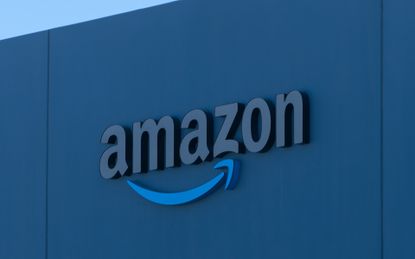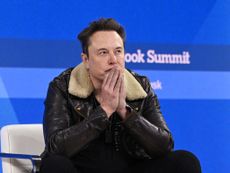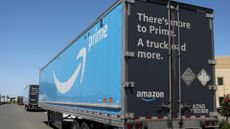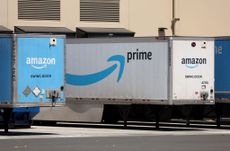Why the FTC antitrust lawsuit against Amazon is so consequential
While it's not the first case the federal agency brought against the company, it might be the biggest challenge yet


The U.S. Federal Trade Commission and 17 states filled a lawsuit against Amazon on Tuesday, accusing the company of monopolistic practices and "setting up a long-awaited antitrust fight with the e-commerce giant that could alter the way Americans shop for everything from toilet paper to electronics online," The New York Times reported. The 172-page lawsuit accused the company of protecting its dominance over online retail by promoting its products at the expense of third-party businesses relying on its distribution. This led to “artificially higher prices” for consumers because merchants were blocked from selling their products elsewhere.
Amazon is “squarely focused on preventing anyone else from gaining that same critical mass of customers,” FTC Chair Lina Khan told reporters after the suit was filed, per CNN. The complaint reflects "the tactics that Amazon has used to suffocate rivals, deprive them of oxygen, and really leave a stunted landscape in its wake.”
David Zapolsky, Amazon’s general counsel, said in a statement that the FTC “is wrong on the facts and the law” with the lawsuit, portions of which were heavily redacted. The complaint shows that the government agency's “focus has radically departed from its mission of protecting consumers and competition,” he said. “If the FTC gets its way, the result would be fewer products to choose from, higher prices, slower deliveries for consumers, and reduced options for small businesses — the opposite of what antitrust law is designed to do,” he warned. Regardless of the outcome, it seems likely that the FTC is determined to take on Big Tech, and the Amazon case could have huge repercussions.
Subscribe to The Week
Escape your echo chamber. Get the facts behind the news, plus analysis from multiple perspectives.

Sign up for The Week's Free Newsletters
From our morning news briefing to a weekly Good News Newsletter, get the best of The Week delivered directly to your inbox.
From our morning news briefing to a weekly Good News Newsletter, get the best of The Week delivered directly to your inbox.
The 'sharpest attack' against Amazon yet.
The FTC's "groundbreaking" antitrust lawsuit "marks the government’s sharpest attack yet against Amazon," Brian Fung wrote for CNN. Amazon has faced heavy scrutiny from the agency lately, including a suit filed in June alleging that the company tricked millions of users into signing up for Amazon Prime. However, "the latest suit against Amazon may rank as the most significant of all" since it "drives at the heart of Amazon’s e-commerce business and focuses on some of the most persistent criticisms of the company," Fung noted.
The case will "doubtless draw fresh criticism" about Khan's "supposed overreach," but Amazon "is precisely the kind of company that Congress had in mind in enacting America’s many antitrust laws," Cory Doctorow, author of “The Internet Con: How to Seize the Means of Computation,” wrote in an op-ed for the Times. Tech barons on large platforms like Amazon, Google, and Meta "can deploy anticompetitive, deceptive, and unfair tactics with the agility and speed of a digital system," Doctorow pointed out. "And Amazon is the apex predator of our platform era."
The government faces an uphill battle
Legal experts told Reuters that the FTC "faces a high bar in trying to show that U.S. consumers would be better off in a world without Amazon's policies in place," the outlet reported. Antitrust attorney David Balto, a former FTC policy director, compared the FTC's fight to trying to climb Washington state's Mt. Rainier in sneakers. "You know, it's conceivable — you could get to the top — but it's 20,000 feet, and it's going to be really cold," he told Reuters.
There's also "no guarantee the FTC will win its case," considering its track record taking on high-profile companies, including its failure to block Microsoft's acquisition of Activision Blizzard, Adam Clark wrote for Barron's. "Even if the FTC does win the lawsuit and presses significant structural changes at Amazon, that could actually unlock some value for shareholders." If the FTC doesn't push for a breakup of Amazon, "the company could face a series of other antitrust measures" that could be "more harmful in the long term than a clean breakup now," Clark posited. "A breakup could prove to be the less painful option."
The FTC's charge that Amazon is a monopolist "doesn’t square with the fact that the company still accounts for less than a third of total e-commerce sales in the U.S. over the last four quarters," Dan Gallagher mused in The Wall Street Journal. "Competition is also growing of late instead of diminishing," he added. "Amazon likely will have to tread more carefully in the future, but it will still be Amazon."

Continue reading for free
We hope you're enjoying The Week's refreshingly open-minded journalism.
Subscribed to The Week? Register your account with the same email as your subscription.
Sign up to our 10 Things You Need to Know Today newsletter
A free daily digest of the biggest news stories of the day - and the best features from our website
Theara Coleman has worked as a staff writer at The Week since September 2022. She frequently writes about technology, education, literature and general news. She was previously a contributing writer and assistant editor at Honeysuckle Magazine, where she covered racial politics and cannabis industry news.
-
 Quiz of The Week: 25 - 1 December
Quiz of The Week: 25 - 1 DecemberPuzzles and Quizzes Have you been paying attention to The Week's news?
By Harriet Marsden, The Week UK Published
-
 Cop28: is the UK serious about tackling climate change?
Cop28: is the UK serious about tackling climate change?Today's Big Question The UK government has watered down a number of climate policies in recent months
By Sorcha Bradley, The Week UK Published
-
 'Why had so many Covid inquiry witnesses called Matt Hancock a liar?'
'Why had so many Covid inquiry witnesses called Matt Hancock a liar?'Instant Opinion Opinion, comment and editorials of the day
By The Week UK Published
-
 Elon Musk overshadows his own Cybertruck rollout
Elon Musk overshadows his own Cybertruck rolloutTalking Point The X owner's latest bizarre public appearance and incendiary comments threaten to derail the 'biggest product launch of anything by far on Earth this year'
By Rafi Schwartz, The Week US Published
-
 Amazon vs. the FTC: Behind the monumental antitrust showdown
Amazon vs. the FTC: Behind the monumental antitrust showdownUnder the Radar The Federal Trade Commission is taking on the e-commerce giant for allegedly building a monopoly in the online market
By Theara Coleman, The Week US Published
-
 Self-service tills: the backlash begins
Self-service tills: the backlash beginsTalking Point Booths, the supermarket chain known as the 'Northern Waitrose', has decided to reintroduce humans to the checkout process
By The Week UK Published
-
 Recent mega-mergers could signal a turning point for the US oil industry
Recent mega-mergers could signal a turning point for the US oil industryTalking Point Both Chevron and Exxon have recently spent billions to acquire smaller oil companies
By Justin Klawans, The Week US Published
-
 Amazon, the 'everything store,' goes to court
Amazon, the 'everything store,' goes to courtFeature Does the retail and tech giant actually have a monopoly or is that argument a bit of a stretch?
By The Week Staff Published
-
 Evergrande was just the beginning. China's property sector is in trouble.
Evergrande was just the beginning. China's property sector is in trouble.Talking Point It's not clear that Xi Jingping's government has the tools to fix the problem
By Joel Mathis Published
-
 Is it time to end the China trade war?
Is it time to end the China trade war?Talking Point The U.S. aims to dial down China trade tensions after years of tit-for-tat tariffs and bans on advanced technology sales
By Harold Maass Published
-
 The AI stock market wave: chancing an Arm?
The AI stock market wave: chancing an Arm?Talking Point The SoftBank-owned British chip designer has started the countdown for a Nasdaq IPO in a snub to the London Stock Exchange
By The Week Staff Published










